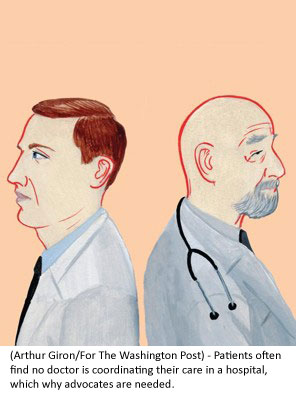 Retired Alexandria internist Marsha Wallace had heard plenty of horror stories about hospital patients falling through the cracks. Still, she was troubled last fall during her own stay at a local hospital when she overheard doctors delivering entirely conflicting messages to the elderly cancer patient who was her roommate.
Retired Alexandria internist Marsha Wallace had heard plenty of horror stories about hospital patients falling through the cracks. Still, she was troubled last fall during her own stay at a local hospital when she overheard doctors delivering entirely conflicting messages to the elderly cancer patient who was her roommate.
“First the surgeon came in and told her he hadn’t found anything,” Wallace recalled. “Then the gastroenterologist came in and said, ‘I just did a CT scan; you have an obstructed kidney.’ Then the internist came in and said, ‘We don’t know what’s wrong, so we may send you to [Johns] Hopkins.’ Then the social worker came in and said, ‘We’re going to discharge you to a rehab hospital.’ ”
The caregivers didn’t appear to be talking to one another, Wallace said.
Coordinated care, touted as the key to better, more cost-effective care, is being encouraged through financial rewards and penalties under the 2010 health-care overhaul, as well as by private insurers. But experts say communication failures remain disturbingly common.
“Nobody is responsible for coordinating care,” said Lucian Leape, a Harvard health-policy analyst and a nationally recognized patient safety leader. “That’s the dirty little secret about health care.”
Advocates for hospital patients and their families say confusion about who is managing a patient’s care and the failure of caregivers to collaborate are endemic, contributing to an estimated 44,000 to 98,000 deaths from medical errors each year. A landmark report by the Institute of Medicine in 1999 cited the fragmented health-care system and patients’ reliance on multiple providers as a leading cause of medical mistakes. Leape, who helped author that report, says there have been improvements since, but “we have not done enough.”
Subsequent studies suggest the toll may be even higher than the Institute of Medicine estimated. A 2010 federal report projected that 15,000 Medicare patients every month suffered such serious harm in the hospital that it contributed to their deaths.
Betsy Gabay, 50, of Queens, barely survived her hospital stay last year for a flare-up of ulcerative colitis.
During her 26 days at New York Hospital Queens, she was seen by at least 14 different doctors, she said, and “I couldn’t tell one name from the next. I didn’t know whether it was the gastroenterologist or the nutritionist or the physical therapist.” All the time, she was rapidly deteriorating, suffering from acute abdominal pain and bloody diarrhea, and too weak to get out of bed. The medical staff decided to send her to a rehab hospital.
“I thought I was being sent there to die,” Gabay said.
That’s when her then 74-year-old mother took action. She contacted a physician friend who got Gabay admitted to Mount Sinai Medical Center in Manhattan. By then, Gabay had a blood clot in her lung and a serious bacterial infection. She also needed to have her diseased colon removed. After surgery and treatment at Mount Sinai and several months of recuperation at home, she has made a complete recovery.
Source: washingtonpost.com








